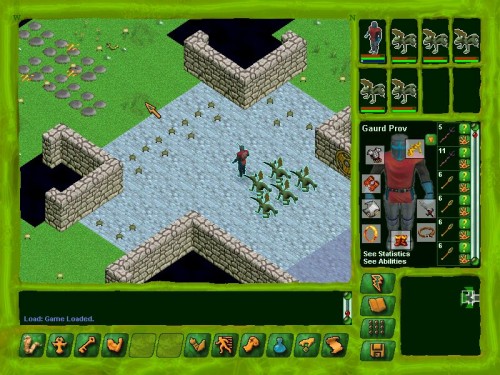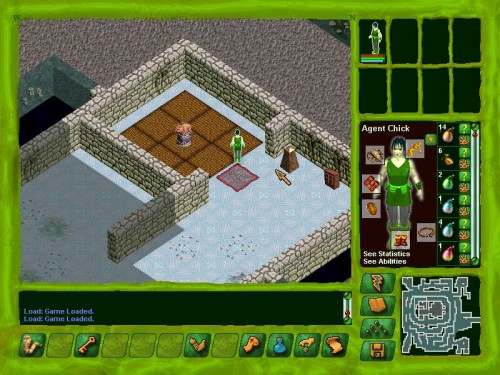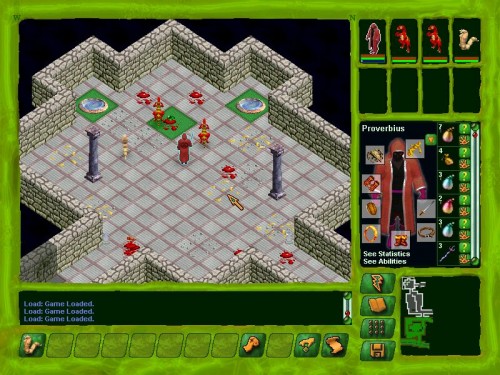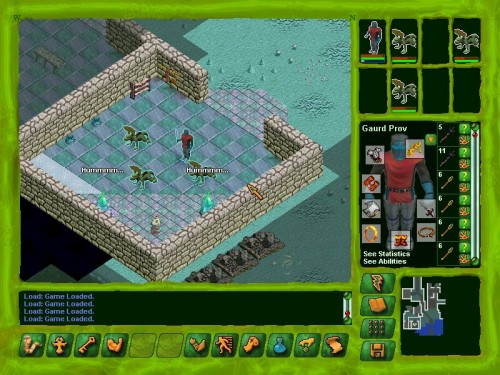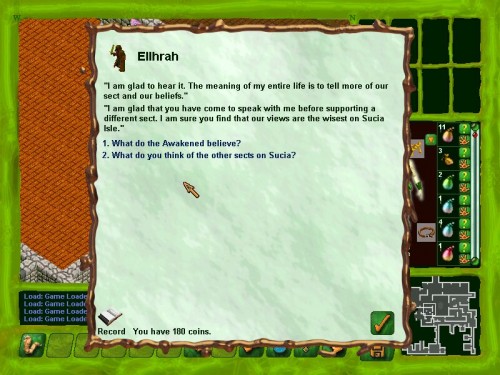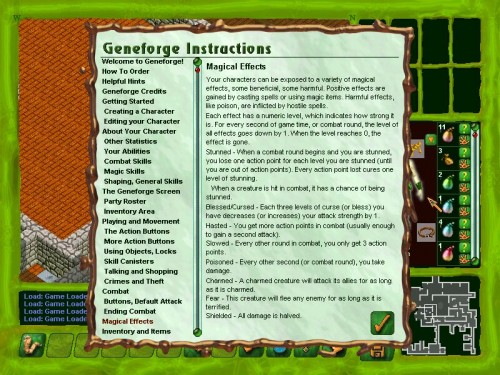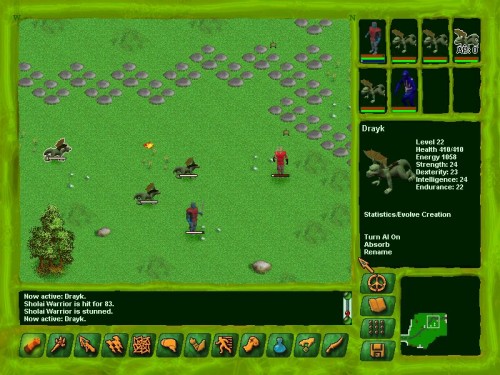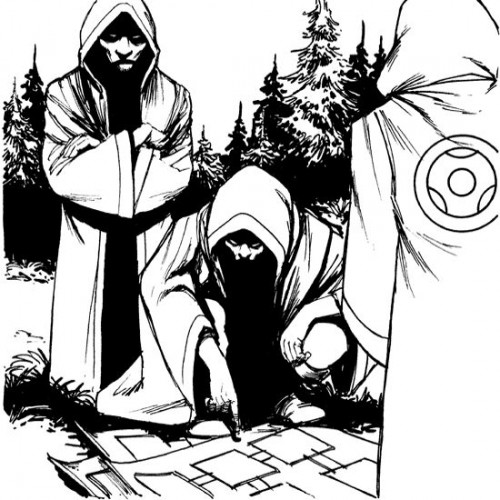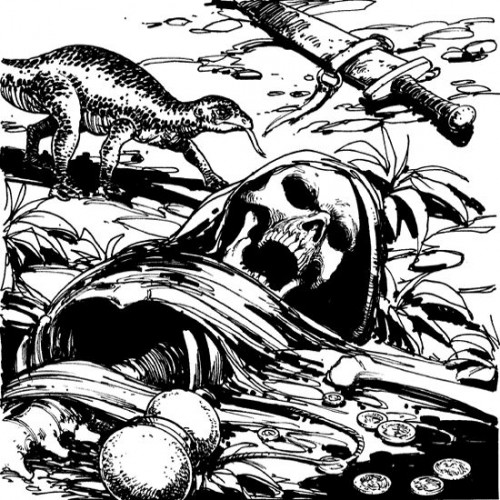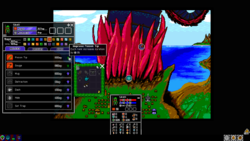Geneforge Review
Geneforge Review
Codex Review - posted by Saint_Proverbius on Sat 19 October 2002, 05:33:22
Tags: Geneforge; Spiderweb SoftwareGeneforge
Introduction to the classic CRPG
In many ways, the CRPGs of today have been sorely lacking any type of role playing. Most of them, in fact, are little more than adventure games or action games with an experience point system. With little to no freedom to determine the story for yourself, or differences based on how the character is designed, it's hard to qualify many of the newer "RPGs" as role playing games at all.
That's not to say a CRPG shouldn't have a story, far from it. The story just shouldn't be so limiting to the player that the player can't control his destiny rather than the game developers doing that for him. You can still have a rich, immersive story without forcing the player to jump through a static and linear plot line that never waivers.
I'm sure there's some people out there who are scoffing, "Yeah, right. A good story means it has to be linear, and close ended! Look at Baldur's Gate!" Well, for those people, I'd recommend they try Geneforge, because Spiderweb Software has proven it can still be done.
Geneforge is, in many ways, a very classic style of CRPG that you just don't see much these days. Geneforge allows the player to chose his path through the world, or in this case, Sucia Island, rather openly. In fact, how you play the game determines the endings, but more on that later.
Who you'll be
The Shapers are a sect of humans who use the magic arts to form organic technology they rely on. Nearly everything the Shapers have is biomechanical in nature. They have living computers, called Servile Minds, which control certain areas, store information, and do what computers normally do. They have living weapons, Thorn Batons, which they use as we would use any firearm. They have living defenses, such as organic Thorn Turrets and intelligent mines which explode when they see a specific threat. Even the boat which is destroyed, stranding you on Sucia, was a living being.
There are three basic classes in Geneforge, but all of them will be referenced as Shaper in the game, since they are part of that order. Most people will not make a distinction in the internal hierarchy of the Shapers, but just refer to them as a whole as "The Shapers".
The most obvious class is the Shaper. Shapers are scientists of the order that bares their name. Shapers use magic to form organic technology, as mentioned above. This class has the best ability to shape creatures into being by using part of their life's essence. Shapers are also fairly good with spells, but they're more focused on letting their creations do the dirty work for them. They get bonuses to shaping skills, but are weaker when it comes to normal combat.
That's why they have Guardians. Guardians are the brute force of the Shapers. They're strong on the fighting arts, but weaker when it comes to magic. However, they are average when it comes to shaping skills. Most Guardians will tend to be melee oriented, but also have a few creations to follow them around and assist them when range is needed.
Lastly, there are the Agents. Agents specialize in spell casting and are weak in shaping skills. If you want to play a pure mage character, the Agent is the perfect class for you. Agents are also average when it comes to melee and baton fighting, so you could effectively do that as well as an Agent. Agents are typically used by Shapers to get dirty jobs done quietly.
Also, just because there are classes doesn't mean you can't make a well rounded character. It's entirely possible for an Agent to shape creations, but they'll never be as good as a Shaper or a Guardian can be at it.
There are, in addition to spell casting, shaping, and combat skills, a set of generic skills that all classes can build up equally.
Leadership is a generic skill which allows you to win friends and influence intelligent beings. Devoting points to Leadership will allow you to get more useful information out of people and will allow you to settle some things peacefully. This skill will also allow you to influence people you don't like and trick them in to doing things detrimental to their goals.
Mechanical is a noteworthy skill as well. It allows you to pick locks, improve how good you are with Living Tools, disarm mines, and open certain containers. The higher this skill is, the less you'll have to use up money and those precious Living Tools you find.
Luck, like in most games that have it, will make it easier to do a wide variety of things better than you would normally.
From there, you're free to be who you want to be. Geneforge is fairly open ended, as I've said before. You're free to be good or evil, or both even. Even though there's no interface device that shows you how good or bad you're being, the game does keep track of things you do and say. The more evil you spread through Sucia, the less likely it'll be for you to get a happy outcome at the end of the game.
The setting
The setting of Geneforge is hard to explain without being wordy, so I'm going to be wordy. It's a fantasy setting, but it's nothing like traditional fantasy games. There are no orcs, goblins, elves, and the classic creatures you'd expect in most fantasy games. In their place, you have creations of Shapers who lived there long ago. Some of these are intelligent, like the Serviles, who were a created race of humanoids designed to serve their Shaper masters.
Serviles, being intelligent and left alone for a few centuries, have formed political factions based on how they view the Shapers who created and abandoned them. There are three groups of Serviles, the Awakened, the Obeyers, and the Takers.
The Awakened want the independence they've earned through surviving without Shaper influence. They believe that the Shapers deserve respect, since they were the ones who created the Serviles in the first place. Without the Shapers, there would be no Serviles. This doesn't mean they respect them enough to just follow any Shaper who comes along. They want to be respected as individuals and not controlled beings.
There's the Obeyers, who believe that Shapers should be respected like the Awakened believe. The difference is that the Obeyers believe they should let a Shaper control them and do the bidding of the Shapers as long as that Shaper is true. If a Shaper goes around talking about how Serviles should be free, they are less likely to believe he's a True Shaper. They're currently doing the goals they believe the Shapers set out to do, and are living under the principles they believe the Shapers would want them to live under.
Finally, there's the Takers. These are Serviles living under harsh conditions and hate the Shapers for leaving them. Because of these conditions, they believe that Shapers are loathsome beings who should neither be respected or followed. There are even members of this faction who believe Shapers should be killed on sight. They don't think the Shapers would allow them freedom on their own, so they must take it in bloody conflict if need be.
Each of these factions has their own territory in the game. Because of their political natures, each faction also tries to undermine the other factions and also spy on each other. You'll often find these spies are more willing to talk to you and give themselves up in the hope that you'll ally with their people. Yes, even the Takers will allow a Shaper to ally with them.
There are several Serviles who don't follow any of the factions. Instead, they chose to live away from these factions, on their own terms. You'll find them living quietly in the less civilized locations of the game. Most of them will provide insight on all the factions, in an unbiased manner. Because of their neutral stances, they're often consulted by all the factions, and can influence them for you.
One of the first things you'll notice once you're in the game is that Sucia has seen better days. Most everything in Sucia has run down over the course of sitting around for hundreds of years. Buildings have missing walls, Servant Minds are either starving or have been killed by raiding Serviles. Many of the creations left behind have gone rogue meaning they're no longer in control. In fact, things have declined so much on Sucia, one could possibly categorize Geneforge as a post apocalyptic RPG.
The game itself: Part 1, the bad
I'm going to list the bad things first, because it's harder to do. Really, there's so much good in the game, I find it hard to make a balanced review for it. However, to be fair, I have to include what detracts from the game in my opinion. So, this is what this section of the review is about, the things I didn't like.
I'll mention the graphics first, because that's what most people will notice from the screenshots. If you're expecting a game that sits back and relies on eye candy to "wow" you, then this isn't the game for you. However, I will say that once you start playing the game, you'll probably be too involved in the setting itself to notice that the graphics aren't the latest and greatest.
There seems to be a problem with the combat in that if you have more than five action points, and less than ten, and you attack or cast a spell, you lose the extra actions points and your turn ends. This seems to be from a design point of view rather than a bug, though. Personally, I don't care much for that. It hinders my ability to attack, and then move away from what I was attacking. If you're a ranged fighter, this doesn't matter because you can move away and then attack. If you're a melee fighter, you will notice this because after an attack, you're stuck standing right next to the person you just attacked.
Shops don't restock goods, nor do they restock money. In fact, it's rather obvious that the only shopper on Sucia is you because the only time shops get new things is when you sell them to the shop. The only time the shops get more money is when you buy things from that shop. This wouldn't be much of a problem due to the number of shops in the game, except that when you ally with a faction, merchants in other faction towns may refuse to sell or buy from you. That could severely limit you from items you may not have had the money to buy originally and shops won't buy things if they can't afford to buy them.
In combat, sometimes the pathfinding gets a little screwy. This is more of a problem for a melee character than it is for the ranged fighters, since a melee character has to move passed his creations to get to the enemy. In fact, a lot of times it will tell you that you can't move to a desired location when you can if you babystep your character.
There's only certain locations where speech can get you out of everything. Leadership really only works on intelligent creatures, naturally, but there's a good deal of fighting that must be done regardless. If you wanted to play a pure diplomatic character, that's not really an option unless you consider letting your creations do your fighting a means of diplomacy. Leadership really only comes in to play in the beginning and at the end of the game for the most part. That's not to say Leadership is useless, it'd just be nice if you could use it more often.
No point blank spell casting can also lead to some problems. If your character is a pure spell caster, there are times when rogues can surround you. If you don't have a weapon, you're stuck and there's nothing you can do about it. Yes, this does actually happen in the game occasionally and is pretty bad when you're playing a solo agent. It's not often that it occurs, mainly around Spawners, but the fact it can happen is a problem.
The experience system in the game is set up so that you can be too high level to get experience from fighting lowly creatures. This can be a problem because there are times when one creature by itself is nothing to you, and you can swat it like a fly. Now, if those creatures were in a group, they could mop the floor with you. Thorn Turrets are a prime example of creatures in numbers which can kill you, but you may be too high level to get experience when you kill them. Really, I wouldn't mind it too much if you only got one or two experience points from killing them, at least that would be something.
Another problem with this experience system is that it makes the player want to find the right route to go in rather than come back to things. Experience in an RPG is a lot like positive re-enforcement. It's an incentive to do things, because you know there will be a reward for your effort. In order to make sure you get a reward, you may find yourself maximizing your potential for experience by doing things in a set order rather than wandering around where you want to go.
The game itself: Part 2, the good
The easy section to write, because there is so much I liked in this game.
The setting is fantastic. It's so refreshing to have a game where it isn't some marketing person's idea of a tried and true formula that will sell like hotcakes at Wal-Mart. It's great to have something that's not like everything else out there. After all, how many fantasy games stick to the Tolkien-esque theme of elves, wraiths, trolls, and what not? Pretty much all of them. That's one of the major draws for me, the difference of the setting.
In addition to it being different, it's also rich. There's a certain consistency about how the Shapers do things. They're people who use magic, but they use magic with scientific results. They research goals, develop new technology, and it's all based in quasi-science.Geneforge started out as a purely science fiction game, and was later changed to more of a fantasy setting. This didn't hurt the game at all. In fact, it made it more likable, in my opinion. Instead of a game that's either fantasy or sci-fi, you have a mix of the two.Geneforge pulls off this mix very well. It doesn't show at all that this wasn't the original design of the game because it seems relatively flawless in it's presentation.
There's a lot to like about how the factions deal with one another. There's very little trust between them, and they don't tend to like one another. This sets up some rather interesting quests, such as a two quests from different factions that rely on the opposite goals around a certain event. One faction may tell you to help them kill bandits raiding their village while another faction might request that you help those bandits raid that village. Even quests that involve the spies are rather interesting, even if they're basically Fed-Ex quests. They're good, because you really want to know more information about things in the game.
Who you can and who you can't trust is a nice theme in this game. Just because someone is allied with a certain group doesn't mean they're good or evil, regardless of how the faction appears to be. The moral ambiguity in the game really gives it a nice, as in fun not as in pleasant, atmosphere to do things. You can't always believe everything you're told either, because the people in the game will lie to you or have been told lies all their lives about things. Just when you think you've made up your mind on who to trust, you usually figure out that you're wrong.
The combat system in the game, from a level design point of view, is great. It's turn based, but there's very little of that "having to take out a sewer full of rats with my Bozar" thing in the game. There's two reasons for this. One is that there aren't a whole lot of areas where you're confronted with hordes of pissant monsters, especially late in the game. The other reason is that you have creatures or spells that attack multiple things at once.
It's good to be good or evil. I've always liked games that involved a bit of morality. Most CRPGs either fall flat on this subject, or don't have much in the way of consequences for your evil actions. In a lot of RPGs, the role of the evil type character, when you boil it down, is the exact same as the role of the good character - only the evil one expects to get paid for being good. Basically, they equate evil to being good guy for hire, which is a really watered down and narrow focused version of evil, when you think about it. Also, any game that allows you to buy back your righteousness, for example, is fairly flawed. If you kill a rather important good guy, I'm not sure a pandering of gold pieces at your local temple would count as absolution. Instead, if you kill a faction leader in Geneforge, expect that faction to completely hate you in the short term to say the very least. In the long term, you'll find out what happens to that faction in the ending of the game, which more than likely won't be a good outcome for that group of people.
Because of the open endedness of the game, it's highly replayable. As soon as I beat the game the first time, I started up a new character to do it all over again. The class system also adds to the replay value because the class archetypes lend themselves to a different style of playing. In addition to that, I'm making different choices this time around, in hopes for a better end result. I managed to basically screw up the world in my relentless powermongering the first time through, so I'm going for a nicer persona this time through. Being open ended means you can enjoy the setting within the same game several times without it getting stale.
The character system is also pretty nice. It's not the most elaborate system in the world, but it does the job and does it well. There's no single thing that you can spend character points on that you're going to find utterly useless in the game. There are stretches where that Leadership skill may not come in handy, but you should appreciate it in both the beginning of the game and at the end, for example.
Summing it all up
Geneforge may not be the perfect RPG, but considering it's a shareware RPG made by one person, it's as close to perfect as you can expect. Sure, it may not win any awards for it's graphics, and there's a little roughness around the edges, but when all is said and done, it's technical merit more than makes up for any of those problems. At the price of admission of $25, it's a steal.
Introduction to the classic CRPG
In many ways, the CRPGs of today have been sorely lacking any type of role playing. Most of them, in fact, are little more than adventure games or action games with an experience point system. With little to no freedom to determine the story for yourself, or differences based on how the character is designed, it's hard to qualify many of the newer "RPGs" as role playing games at all.
That's not to say a CRPG shouldn't have a story, far from it. The story just shouldn't be so limiting to the player that the player can't control his destiny rather than the game developers doing that for him. You can still have a rich, immersive story without forcing the player to jump through a static and linear plot line that never waivers.
I'm sure there's some people out there who are scoffing, "Yeah, right. A good story means it has to be linear, and close ended! Look at Baldur's Gate!" Well, for those people, I'd recommend they try Geneforge, because Spiderweb Software has proven it can still be done.
Geneforge is, in many ways, a very classic style of CRPG that you just don't see much these days. Geneforge allows the player to chose his path through the world, or in this case, Sucia Island, rather openly. In fact, how you play the game determines the endings, but more on that later.
Who you'll be
The Shapers are a sect of humans who use the magic arts to form organic technology they rely on. Nearly everything the Shapers have is biomechanical in nature. They have living computers, called Servile Minds, which control certain areas, store information, and do what computers normally do. They have living weapons, Thorn Batons, which they use as we would use any firearm. They have living defenses, such as organic Thorn Turrets and intelligent mines which explode when they see a specific threat. Even the boat which is destroyed, stranding you on Sucia, was a living being.
There are three basic classes in Geneforge, but all of them will be referenced as Shaper in the game, since they are part of that order. Most people will not make a distinction in the internal hierarchy of the Shapers, but just refer to them as a whole as "The Shapers".
The most obvious class is the Shaper. Shapers are scientists of the order that bares their name. Shapers use magic to form organic technology, as mentioned above. This class has the best ability to shape creatures into being by using part of their life's essence. Shapers are also fairly good with spells, but they're more focused on letting their creations do the dirty work for them. They get bonuses to shaping skills, but are weaker when it comes to normal combat.
That's why they have Guardians. Guardians are the brute force of the Shapers. They're strong on the fighting arts, but weaker when it comes to magic. However, they are average when it comes to shaping skills. Most Guardians will tend to be melee oriented, but also have a few creations to follow them around and assist them when range is needed.
Lastly, there are the Agents. Agents specialize in spell casting and are weak in shaping skills. If you want to play a pure mage character, the Agent is the perfect class for you. Agents are also average when it comes to melee and baton fighting, so you could effectively do that as well as an Agent. Agents are typically used by Shapers to get dirty jobs done quietly.
Also, just because there are classes doesn't mean you can't make a well rounded character. It's entirely possible for an Agent to shape creations, but they'll never be as good as a Shaper or a Guardian can be at it.
There are, in addition to spell casting, shaping, and combat skills, a set of generic skills that all classes can build up equally.
Leadership is a generic skill which allows you to win friends and influence intelligent beings. Devoting points to Leadership will allow you to get more useful information out of people and will allow you to settle some things peacefully. This skill will also allow you to influence people you don't like and trick them in to doing things detrimental to their goals.
Mechanical is a noteworthy skill as well. It allows you to pick locks, improve how good you are with Living Tools, disarm mines, and open certain containers. The higher this skill is, the less you'll have to use up money and those precious Living Tools you find.
Luck, like in most games that have it, will make it easier to do a wide variety of things better than you would normally.
From there, you're free to be who you want to be. Geneforge is fairly open ended, as I've said before. You're free to be good or evil, or both even. Even though there's no interface device that shows you how good or bad you're being, the game does keep track of things you do and say. The more evil you spread through Sucia, the less likely it'll be for you to get a happy outcome at the end of the game.
The setting
The setting of Geneforge is hard to explain without being wordy, so I'm going to be wordy. It's a fantasy setting, but it's nothing like traditional fantasy games. There are no orcs, goblins, elves, and the classic creatures you'd expect in most fantasy games. In their place, you have creations of Shapers who lived there long ago. Some of these are intelligent, like the Serviles, who were a created race of humanoids designed to serve their Shaper masters.
Serviles, being intelligent and left alone for a few centuries, have formed political factions based on how they view the Shapers who created and abandoned them. There are three groups of Serviles, the Awakened, the Obeyers, and the Takers.
The Awakened want the independence they've earned through surviving without Shaper influence. They believe that the Shapers deserve respect, since they were the ones who created the Serviles in the first place. Without the Shapers, there would be no Serviles. This doesn't mean they respect them enough to just follow any Shaper who comes along. They want to be respected as individuals and not controlled beings.
There's the Obeyers, who believe that Shapers should be respected like the Awakened believe. The difference is that the Obeyers believe they should let a Shaper control them and do the bidding of the Shapers as long as that Shaper is true. If a Shaper goes around talking about how Serviles should be free, they are less likely to believe he's a True Shaper. They're currently doing the goals they believe the Shapers set out to do, and are living under the principles they believe the Shapers would want them to live under.
Finally, there's the Takers. These are Serviles living under harsh conditions and hate the Shapers for leaving them. Because of these conditions, they believe that Shapers are loathsome beings who should neither be respected or followed. There are even members of this faction who believe Shapers should be killed on sight. They don't think the Shapers would allow them freedom on their own, so they must take it in bloody conflict if need be.
Each of these factions has their own territory in the game. Because of their political natures, each faction also tries to undermine the other factions and also spy on each other. You'll often find these spies are more willing to talk to you and give themselves up in the hope that you'll ally with their people. Yes, even the Takers will allow a Shaper to ally with them.
There are several Serviles who don't follow any of the factions. Instead, they chose to live away from these factions, on their own terms. You'll find them living quietly in the less civilized locations of the game. Most of them will provide insight on all the factions, in an unbiased manner. Because of their neutral stances, they're often consulted by all the factions, and can influence them for you.
One of the first things you'll notice once you're in the game is that Sucia has seen better days. Most everything in Sucia has run down over the course of sitting around for hundreds of years. Buildings have missing walls, Servant Minds are either starving or have been killed by raiding Serviles. Many of the creations left behind have gone rogue meaning they're no longer in control. In fact, things have declined so much on Sucia, one could possibly categorize Geneforge as a post apocalyptic RPG.
The game itself: Part 1, the bad
I'm going to list the bad things first, because it's harder to do. Really, there's so much good in the game, I find it hard to make a balanced review for it. However, to be fair, I have to include what detracts from the game in my opinion. So, this is what this section of the review is about, the things I didn't like.
I'll mention the graphics first, because that's what most people will notice from the screenshots. If you're expecting a game that sits back and relies on eye candy to "wow" you, then this isn't the game for you. However, I will say that once you start playing the game, you'll probably be too involved in the setting itself to notice that the graphics aren't the latest and greatest.
There seems to be a problem with the combat in that if you have more than five action points, and less than ten, and you attack or cast a spell, you lose the extra actions points and your turn ends. This seems to be from a design point of view rather than a bug, though. Personally, I don't care much for that. It hinders my ability to attack, and then move away from what I was attacking. If you're a ranged fighter, this doesn't matter because you can move away and then attack. If you're a melee fighter, you will notice this because after an attack, you're stuck standing right next to the person you just attacked.
Shops don't restock goods, nor do they restock money. In fact, it's rather obvious that the only shopper on Sucia is you because the only time shops get new things is when you sell them to the shop. The only time the shops get more money is when you buy things from that shop. This wouldn't be much of a problem due to the number of shops in the game, except that when you ally with a faction, merchants in other faction towns may refuse to sell or buy from you. That could severely limit you from items you may not have had the money to buy originally and shops won't buy things if they can't afford to buy them.
In combat, sometimes the pathfinding gets a little screwy. This is more of a problem for a melee character than it is for the ranged fighters, since a melee character has to move passed his creations to get to the enemy. In fact, a lot of times it will tell you that you can't move to a desired location when you can if you babystep your character.
There's only certain locations where speech can get you out of everything. Leadership really only works on intelligent creatures, naturally, but there's a good deal of fighting that must be done regardless. If you wanted to play a pure diplomatic character, that's not really an option unless you consider letting your creations do your fighting a means of diplomacy. Leadership really only comes in to play in the beginning and at the end of the game for the most part. That's not to say Leadership is useless, it'd just be nice if you could use it more often.
No point blank spell casting can also lead to some problems. If your character is a pure spell caster, there are times when rogues can surround you. If you don't have a weapon, you're stuck and there's nothing you can do about it. Yes, this does actually happen in the game occasionally and is pretty bad when you're playing a solo agent. It's not often that it occurs, mainly around Spawners, but the fact it can happen is a problem.
The experience system in the game is set up so that you can be too high level to get experience from fighting lowly creatures. This can be a problem because there are times when one creature by itself is nothing to you, and you can swat it like a fly. Now, if those creatures were in a group, they could mop the floor with you. Thorn Turrets are a prime example of creatures in numbers which can kill you, but you may be too high level to get experience when you kill them. Really, I wouldn't mind it too much if you only got one or two experience points from killing them, at least that would be something.
Another problem with this experience system is that it makes the player want to find the right route to go in rather than come back to things. Experience in an RPG is a lot like positive re-enforcement. It's an incentive to do things, because you know there will be a reward for your effort. In order to make sure you get a reward, you may find yourself maximizing your potential for experience by doing things in a set order rather than wandering around where you want to go.
The game itself: Part 2, the good
The easy section to write, because there is so much I liked in this game.
The setting is fantastic. It's so refreshing to have a game where it isn't some marketing person's idea of a tried and true formula that will sell like hotcakes at Wal-Mart. It's great to have something that's not like everything else out there. After all, how many fantasy games stick to the Tolkien-esque theme of elves, wraiths, trolls, and what not? Pretty much all of them. That's one of the major draws for me, the difference of the setting.
In addition to it being different, it's also rich. There's a certain consistency about how the Shapers do things. They're people who use magic, but they use magic with scientific results. They research goals, develop new technology, and it's all based in quasi-science.Geneforge started out as a purely science fiction game, and was later changed to more of a fantasy setting. This didn't hurt the game at all. In fact, it made it more likable, in my opinion. Instead of a game that's either fantasy or sci-fi, you have a mix of the two.Geneforge pulls off this mix very well. It doesn't show at all that this wasn't the original design of the game because it seems relatively flawless in it's presentation.
There's a lot to like about how the factions deal with one another. There's very little trust between them, and they don't tend to like one another. This sets up some rather interesting quests, such as a two quests from different factions that rely on the opposite goals around a certain event. One faction may tell you to help them kill bandits raiding their village while another faction might request that you help those bandits raid that village. Even quests that involve the spies are rather interesting, even if they're basically Fed-Ex quests. They're good, because you really want to know more information about things in the game.
Who you can and who you can't trust is a nice theme in this game. Just because someone is allied with a certain group doesn't mean they're good or evil, regardless of how the faction appears to be. The moral ambiguity in the game really gives it a nice, as in fun not as in pleasant, atmosphere to do things. You can't always believe everything you're told either, because the people in the game will lie to you or have been told lies all their lives about things. Just when you think you've made up your mind on who to trust, you usually figure out that you're wrong.
The combat system in the game, from a level design point of view, is great. It's turn based, but there's very little of that "having to take out a sewer full of rats with my Bozar" thing in the game. There's two reasons for this. One is that there aren't a whole lot of areas where you're confronted with hordes of pissant monsters, especially late in the game. The other reason is that you have creatures or spells that attack multiple things at once.
It's good to be good or evil. I've always liked games that involved a bit of morality. Most CRPGs either fall flat on this subject, or don't have much in the way of consequences for your evil actions. In a lot of RPGs, the role of the evil type character, when you boil it down, is the exact same as the role of the good character - only the evil one expects to get paid for being good. Basically, they equate evil to being good guy for hire, which is a really watered down and narrow focused version of evil, when you think about it. Also, any game that allows you to buy back your righteousness, for example, is fairly flawed. If you kill a rather important good guy, I'm not sure a pandering of gold pieces at your local temple would count as absolution. Instead, if you kill a faction leader in Geneforge, expect that faction to completely hate you in the short term to say the very least. In the long term, you'll find out what happens to that faction in the ending of the game, which more than likely won't be a good outcome for that group of people.
Because of the open endedness of the game, it's highly replayable. As soon as I beat the game the first time, I started up a new character to do it all over again. The class system also adds to the replay value because the class archetypes lend themselves to a different style of playing. In addition to that, I'm making different choices this time around, in hopes for a better end result. I managed to basically screw up the world in my relentless powermongering the first time through, so I'm going for a nicer persona this time through. Being open ended means you can enjoy the setting within the same game several times without it getting stale.
The character system is also pretty nice. It's not the most elaborate system in the world, but it does the job and does it well. There's no single thing that you can spend character points on that you're going to find utterly useless in the game. There are stretches where that Leadership skill may not come in handy, but you should appreciate it in both the beginning of the game and at the end, for example.
Summing it all up
Geneforge may not be the perfect RPG, but considering it's a shareware RPG made by one person, it's as close to perfect as you can expect. Sure, it may not win any awards for it's graphics, and there's a little roughness around the edges, but when all is said and done, it's technical merit more than makes up for any of those problems. At the price of admission of $25, it's a steal.






